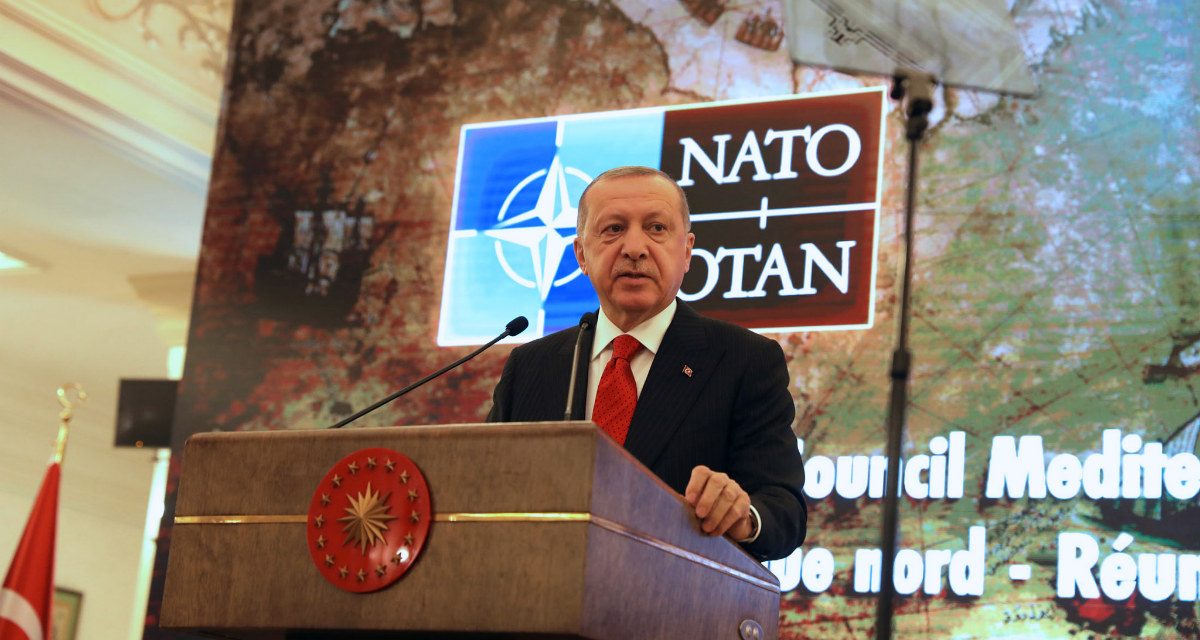Editor’s note: This analysis is informed by the authors’ fieldwork in Turkey and northern Iraq, to include interviews with Turkish military personnel and Kurdish rebels.
President Recep Tayyip Erdoğan has put Turkey into a strategic impasse on all sides. Erdoğan and his ruling Justice and Development Party (AKP) have doubled down on the decision to acquire the Russian S-400 air defense system, expecting delivery by the end of June. They have made this decision despite numerous American concessions and four US senators recently writing an op-ed in the New York Times with a clear warning in its headline: “A U.S. Fighter Jet or a Russian Missile System. Not Both.” The senators declare that US law will force sanctions against Turkey if it accepts delivery of an S-400 system from Russia.
Accordingly, US leaders halted delivery of F-35 parts to Turkey, due to security concerns that the S-400 could compromise the fighter’s stealth abilities. This is a valid concern given that the Russians will likely install a “back door” on their S-400s, enabling them to access data, in an attempt to improve their algorithms in detecting US and NATO aircraft. The tensions Turkey’s actions have triggered with the United States and NATO are not some form of superficial strategic negotiations meant to extract resources from the West; they reflect a new, Erdoğan-led Turkish strategic outlook that is in line with his authoritarian turn. The domestic political logic of Erdoğan and the AKP has led them to “remake” the Turkish state in a way that is substantially at odds with the Western-oriented secular republic Ataturk founded in 1923.
Erdoğan’s new authoritarian vision for Turkey has left the country’s relations with the united States and NATO at their lowest point since Turkey’s accession to NATO in 1952. He even brazenly threatened US troops with an “Ottoman slap” for operating alongside Kurdish militias in the fight against ISIS in Syria and northern Iraq. Moreover, the “controlled coup” in 2016 and the subsequent purges of government and military officials deemed too Western or secular have only further undermined the viability of Turkish democracy and greatly reduced the military effectiveness of the Turkish armed forces. Such changes reflect a great divergence between Turkey’s interests and those of the West, meaning that NATO needs to have a plan in place once Turkey receives the Russian S-400s. This might include possibly removing US tactical B61 nuclear bombs from İncirlik Air Base, shifting military aid and resources toward Greece, and maybe even lending diplomatic support to Greece to undermine Turkey’s claims on Cyprus.
An Illogical Logic: Erdoğan needs Drama
Expertly playing the beleaguered ruler and tragic hero is part of Erdoğan’s domestic logic of survival. He once again hopes to emerge relatively unscathed from the political drama he has created, as a way of consolidating his authoritarian rule. Playing his international opponents against one another, Erdoğan can drive a wedge between his domestic opponents. The strategic impasse Erdoğan has created for Turkey is unlike previous games of political brinkmanship because the Syrian Civil War led the United States (and other Western governments) to make decisions, such as closely aligning with Kurdish rebels, altering Erdoğan’s perception of threats to Turkey, to include rapprochement with Russia.
American leaders should think of the long game: Erdoğan and Turkey are not synonymous. Erdoğan will ultimately decide if there is a break with the United States or NATO by accepting delivery of the S-400s. He might even play this game until after Istanbul’s June 23 election do-over with a domestic audience in mind, possibly pursuing a face-saving measure. The danger, however, cannot be underestimated. Erdoğan has boxed himself in with the United States, NATO, and even Russia. Domestic and external political logic may force Erdoğan to use Turkish relations with the West (by extension, his ostensible fight with NATO and the Americans in particular) as the decisive trump card. It is a trap difficult for Erdoğan to escape because “strife” with the West—being perceived as a besieged warrior—drums up support from his base, translating into votes for him and the AKP.
A Russian Air Defense System for a NATO member?
Since its founding, NATO member states have generally worked toward acquiring Western weapon systems for conventional military operations. Much of NATO’s collective security logic is dependent upon ease of interoperability and integration between different NATO military personnel and weapon systems. In fact, most NATO members that have Russian military equipment are former Soviet bloc countries that joined NATO after the Cold War, and only three NATO members (Bulgaria, Greece, and Slovakia) have been allowed to buy Russian military missile systems, primarily because they were purchasing older systems like the S-300. Not one NATO member state has dared to buy advanced military equipment from a non-Western state, until Turkish leaders floated the idea of buying Chinese missile defense systems in 2013 (later abandoned), and again in 2016 with the idea of buying an advanced Russian air defense system.
Erdoğan and the AKP have repeatedly painted a deliberately erroneous picture of the S-400 purchase, despite the danger the S-400 poses in compromising the stealthy F-35. The United States and NATO, while being firm on the position that Turkey cannot have both, have made serious concessions to the benefit of Turkey, which Erdoğan has completely disregarded. They range from discounted Patriot Air Defense Systems to guarantees that the Kurdish People’s Protection Units (YPG)—whose fight against ISIS the United States has supported in Syria—would be cleared from Syrian territory on the Turkish border so as not to threaten Turkey. US Special Envoy to Syria James Jeffrey even raised the possibility of Turkey being allowed to occupy the northern part of Syria, against the wishes of Kurdish militias that fought with US support against ISIS. In effect, Jeffrey offered to forgo tactical alliances with the Kurds—thereby losing all Western credibility with the Kurds on the ground—with the hope of getting Erdoğan to cancel the S-400 deal. In spite of all American concessions, Erdoğan once again publicly proclaimed that there would be “no backtracking on S-400 deal with Russia.”
Erdoğan’s chronic anti-Western ideological predilections and his domestic logic of survival are increasingly leading Turkey toward a clean break with the United States and NATO. Such an action would play well with his domestic base; even any economic ramifications could be twisted to portray him as the beleaguered hero making the difficult but necessary decisions that will establish neo-Ottoman power in the Middle East. Erdoğan is also a canny survivor that has singlehandedly shaped the Turkish state into a decreasingly democratic one, with a growing despotism at its center, and burnished with Islamist credentials. At the same time, Erdoğan is a pragmatist, knowing that accepting the Russian S-400 spells certain economic catastrophe. US sanctions would be enacted, and the Turkish economy, already in a recession, would risk going into a tailspin.
Erdoğan’s particular mix of political savvy, pragmatism, and authoritarian impulses was on display after the defeat of the AKP in Istanbul’s mayoral election. Erdoğan simply insisted on a recount, and the country’s electoral council complied, annulling the results and ordering a new election. Winning the crown jewel of the Istanbul mayoralty, arguably by devious means, is one thing. But destroying Turkish-NATO relations as a part of a winning formula for the AKP in the short term, will lead to a weak Turkish economy and military in the long term.
Between the Bad and the Ugly: The Turkish Future
In this strategic milieu, Erdoğan has staked his reputation on winning the fresh Istanbul elections on June 23, using the acquisition of the Russian S-400 as a sovereign rallying cry to politically dominate. Erdoğan in the meantime has capitalized on every concession the United States has made only to double down on the S-400. The only saving grace in this context of exceptional American strategic incompetence is a congressionally mandated hurdle against allowing Russian air defense technology to compromise the stealthy F-35. That is, Erdoğan can play rhetorical brinkmanship and hold the Turkey-NATO relationship hostage, but American congressional mandates will at least hold Erdoğan accountable, for better or for worse.
Erdoğan has two options, one bad and one ugly; the Russian S-400 or the American F-35, never both. While American policymakers may be wishing that the pragmatic survivor side of Erdoğan will force him to come to his senses and back out of the deal with the Russians a day before the delivery of the S-400, he may not, simply out of the desire to cement his authoritarian rule through continued anti-Western rhetoric. However, if the AKP wins the mayoral elections on June 23, Erdoğan might finally walk away from the abyss that Turkey is lurching towards. Erdoğan no longer has the time or space to negotiate with the United States and NATO by, essentially, holding a gun to his own head.
Given his consolidation of power in Turkey, only Erdoğan can decide if he wants Turkey to be successful through continued ties with the West or would rather pursue Russian ties and continue to expand his authoritarianism. Either way, Erdoğan cannot carry on the drama anymore: He must carry the burden of the “bad” decision of cozying up to Russia, or go “ugly” and take domestic responsibility for choosing the F-35. Likewise, US and NATO leaders must be willing to quickly pivot toward more reliable partners in shoring up a new eastern flank to deter Russian and Iranian hostilities in the region.
The views expressed in this article are those of the authors and do not reflect the official policy or position of the Department of the Army, Department of Defense, or the US government.
Image credit: NATO




I think that the Russian S-400 or U.S. F-35 issue is more than just the best Russian SAM system vs. the latest American Stealth fighter.
West Point Academy students and officers and U.S. DoD need to understand that the Turkish military and defense industry is rising rapidly with the creation of new, unique, capable, and excellent designs in arms and vehicles. Just look at IDEF Istanbul 2019’s Defense Expo. Some of the prototype vehicles there from FNSS and Otokar are excellent and rival any design made in the West, such as the electric Scout vehicle, the AAV “ZAHA” amphib (better than the USMC’s AAV7), the PARS, the Tulpar Light Tank, the Kaplan Medium Tank, and other offerings and designs that NATO doesn’t even have.
If Turkey was to establish closer ties with Russia, NATO and the U.S. may see the reemergence of collaboration on the scale of the two French Mistral helicopter carriers that were built for Russia and then later sold to Europe due to the Russian-Ukraine conflict. If Russia actually possessed those Mistral ships, then Russia’s amphibious forces would be greatly enhanced.
Would Russia be a purchaser of Turkish armaments if Turkey buys the S-400 SAMs? And if so, would Russian military capabilities increase dramatically and also feed the Russian allies systems that they never had before? Would those Turkish arms be reverse-engineered for Russian purposes? That is the imminent threat with the S-400 or F-35 conflict deal. What was once an ally can turn into a threat.
This Gray Zone/Area between Russia, Turkey, and NATO is political and needs to be nipped. There should be no Gray Zone of “foggy area.” Turkey is either with NATO 100% or isn’t. The U.S. is wise to stop shipping F-35 parts to Turkey until their loyalty is proven. The U.S. should also investigate other sensitive areas for future U.S. National Security.